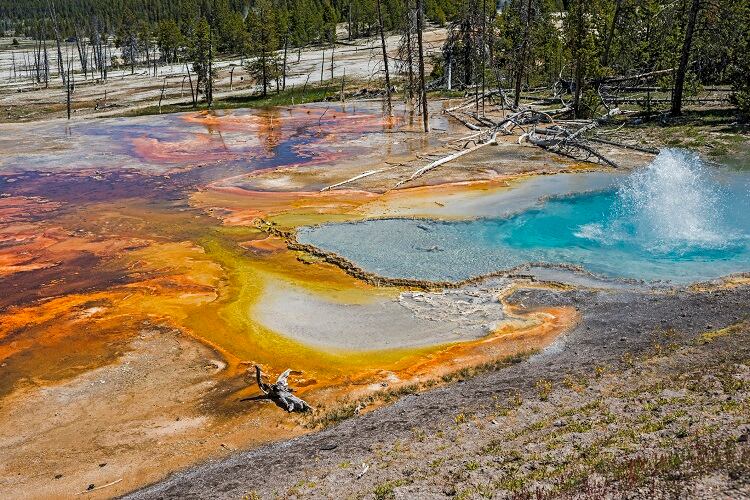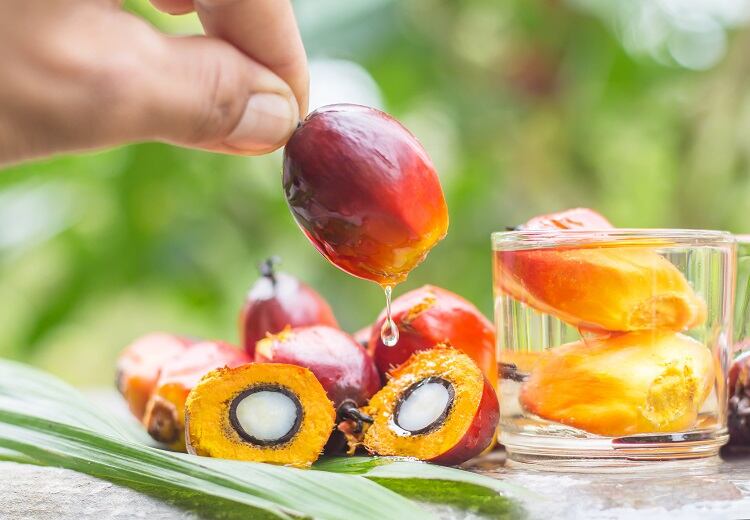Arkeon Biotechnologies was founded in response to the world’s current food systems, which all three co-founders – CEO Gregor Tegl, CSO Simon Rittman, and CTO Günther Bochmann – deem to be unsustainable.
Bochmann and Rittman joined the start-up with an interest in gas fermentation. The duo believes in the potential of repurposing environmentally harmful gas for good.
Tegl, on the other hand, has long been ‘fascinated’ by enzymes, he recalled.
“That’s where we combined. We found that combining two things, notably gas fermentation and enzymes, can upgrade the functionality of whatever is coming out of the bioreactor. It’s a powerful tool to convert waste streams, such as CO2, into value-added products.”
This is the Austrian start-up’s strategy. Combining science with a life-long passion for food, Arkeon wants to fix the world’s broken food systems by producing protein ingredients the ‘most sustainable way possible’. “We think we’ve found a pretty good way of doing that,” Tegl told FoodNavigator.
Producing all 20 amino acids in one fermentation
Arkeon is developing a novel way of producing the ‘building blocks’ of protein: amino acids.
Amino acids are monomers that when linked together form the chains we know as proteins. It is the amino acids that make up the protein that our bodies use for energy, explained Tegl.
Proteins are complex in nature and can be difficult to work with, which is why the start-up is interested in producing only the ‘building blocks’ themselves. “We circumvent all the trade-offs that come with the nature of a protein.”
Arkeon does this by leveraging microorganisms. The start-up has identified an archaeon capable of producing all 20 amino acids required for human nutrition in one ‘natural’ fermentation process.
Archaea are single-cell organisms considered a ‘major part of Earth’s life’. They live in extreme environments such as hot springs and salt lakes and are part of the microbiota of all organisms. In the human microbiome, for example, they are found in the gut, mouth, and on the skin.

Producing all amino acids in one fermentation is ‘unheard of’, stressed Tegl. Of course, Arkeon is not the first start-up to product alternative proteins with microbes in a lab. However, Arkeon’s mode of production is unique, the CEO suggested.
Other microbes producing amino acids tend to ‘keep them for themselves’ to create biomass, Tegl explained. “Our microbe is producing all these amino acids and spitting them outside the cell, so we can retrieve these building blocks and already have a really valuable nutrient source from our culture medium.”
This is one of Arkeon’s ‘key advantages’, according to the CEO. While a wealth of scientists is studying the physiology of such organisms, very few are interested in their biotechnological exploitation. “This gives us a competitive advantage.”
Carbon from CO2, energy from hydrogen
Another advantage of Arkeon’s technology is its carbon source. It turns out the start-up’s archaeon of choice likes to feed on carbon dioxide, which is handy given that CO2 is common waste product.
“You can use CO2 from any industry. The easiest, at least in the beginning, would be microbially produced – such as from breweries of bioethanol plants. That’s very pure CO2 and already food-grade because it’s coming out of a food production process,” Tegl explained, adding that using CO2 in this way makes its production carbon negative. “So that’s a very attractive source.”
The other gas input is hydrogen, which in produced from electricity and water. A green hydrogen approach would require water and renewable energy. “That can be done on-site using an electrolyser, but we are also in touch with green hydrogen producers…to ensure a strong and secure supply.”
The CEO likened the fermentation to that used in beer brewing, with the main differentiator being that in Arkeon’s case, the carbon source comes from CO2 and the energy source, hydrogen.
The fermentation itself takes place in an off-the-shelf bioreactor operating at atmospheric pressure, which Tegl explained is uncommon in gas fermentation. “The higher the pressure in the vessel, the better the gas dissolves. But when you have a microbe like ours, which is so efficient in taking up those gases, you don’t need [higher pressure].”
In so doing, Arkeon’s gas fermentation process is economically viable, we were told.
Using these two gas inputs means that the process is independent of agriculture. No part of Arkeon’s feedstock grows on arable land, which the start-up stressed is a ‘big advantage’ – particularly given the ‘climate catastrophe’ we are facing, and temperature fluctuations impacting the agricultural sector.
Collaborating with plant-based
Once the archeon has produced amino acids in the bioreactor, the start-up binds them to peptides. From there, Arkeon says it can make a variety of functional foods.
A key benefit in working with amino acids, rather than protein, is that Arkeon’s solution is ‘highly soluble’. Other advantages in working with amino acids rather than plant proteins lie in avoiding some of the ‘pain points’ of the protein industry, Tegl explained.
Pea protein, for example, come with off-notes that food formulators often have to mask with additional ingredients. Another key issue is bioavailability.
Protein quality is typically defined in terms of protein digestibility-corrected amino acid score (PDCAAS), which is a measure of its essential amino acid composition and digestibility.
While some plant proteins, such as soy protein, are considered good quality proteins with a PDCAAS score of 1 (the highest possible score), others score much lower. Tree nuts, for example come in under 0.50, with wheat gluten even lower.
Meat products such as chicken, on the other hand, has a PDCAAS score of 0.95 and beef, 0.92.
Arkeon’s solution offers the nutritional equivalent to meat, which as shown by the PDCAAS ranking, is higher than a lot of plant proteins available. The start-up’s powdered ingredients, therefore, can help improve the nutritional profiles of plant-based analogues, Tegl explained.

The ‘next generation’ of plant-based products will increasingly focus on alt seafood, the CEO predicts, such as smoked, raw fish. However, these products are not ‘remotely close’ to the nutritional profile of alt meat products on the market.
“If we are truly going to swap from conventional meat to alternative protein products, but those offerings don’t provide the nutritional value of meat, we will have a huge issue on our hands and nutritional deficiencies.”
This is where Arkeon plans to make a difference. The start-up wants to collaborate with vegan start-ups to ensure their products’ protein content is up to scratch, without compromising on consistency or taste. “That is something our protein ingredients can deliver.”
Barriers to commercialisation
Arkeon is looking to commercialisation in Europe and the US, but revealed Singapore is also on its radar.
Its ingredient is classified as a Novel Food under EU law, meaning that regulatory approval will need to be sought before marketing its ingredient on home soil. “While it is classified as a novel food, it’s not because of the ingredients we’re producing – because they are well known.
“It’s simply due to the microbe we’re using, which has not been used in food production before.”
It may well be that because Arkeon’s technology does not rely on genetic engineering, and if it can prove its end product is not contaminated with the cell’s DNA, the process is straightforward.
That is not to say that Arkeon is against genetic engineering. Thanks to current efficiencies, the start-up won’t look at incorporating the technology in the short- to mid-term, but wouldn’t be against genetically programming its microbe in the future. “For a protein ingredient, it’s simply an incredibly efficient thing to do, and not harmful.”

Scale is another challenge, and one that almost all novel fermentation-based protein start-ups are facing. Arkeon is currently transitioning into a 150L bioreactor and expects that spending time identifying its scaling criterion and understanding its bottlenecks will pay off.
Concerning price parity, the start-up believes it can undercut the cost of equivalent proteins by half. When producing at full scale, the start-up expects its product will retail for around €7 per kg of dry weight.
FoodNavigator also queried Tegl about consumer acceptance. Will consumers be willing to eat amino acids produced in a lab? “Fermentation has been used in food production for millennia, it's one of the most natural ways to produce protein," he explained. “By the way, when consuming beer, you’re not thinking about the steel tanks it’s produced in.”
What is ‘crucial’ for fermentation start-ups is that fermentation in general is somewhat in vogue, whether it be in the form of kombucha, sauerkraut, or kefir. The process is increasingly understood by consumers, and if it’s tasty and healthy, the start-up doesn’t foresee any issues.
“If we do encounter any problems in consumer acceptance in the future, it’s because we, as an industry, didn’t spend enough time educating customers about the product.”
Consumer acceptance will also come from how the ingredient will feature on-pack. While this is something that will be decided in the regulatory approval process, Tegl had a preference for ‘cultured protein source’. “I think that’s a very tangible term, and one we’d like to follow.”




